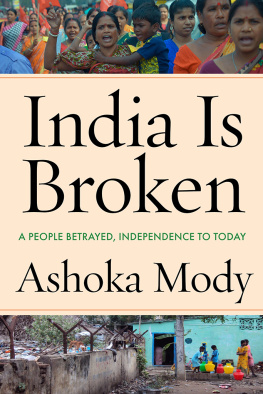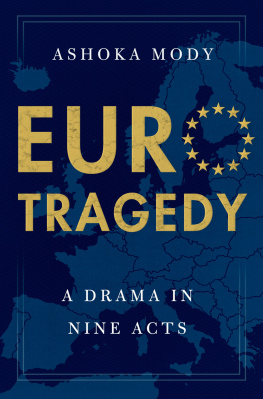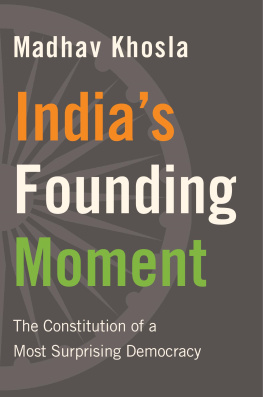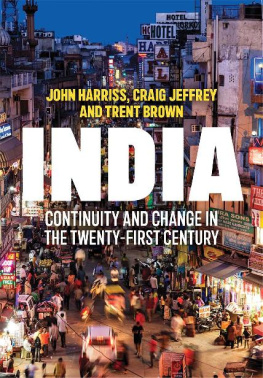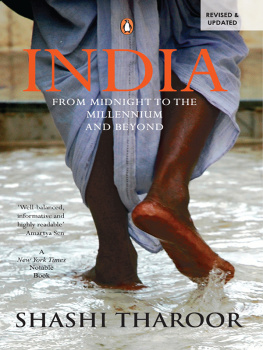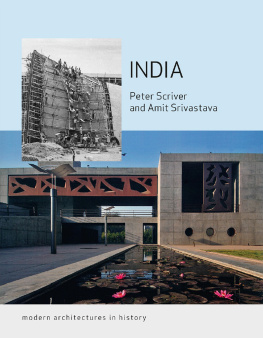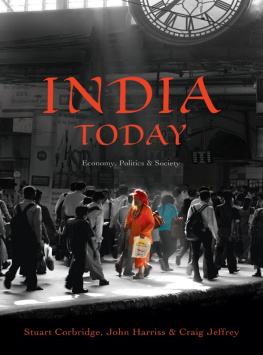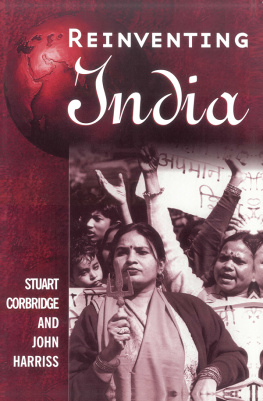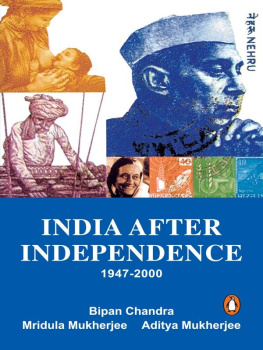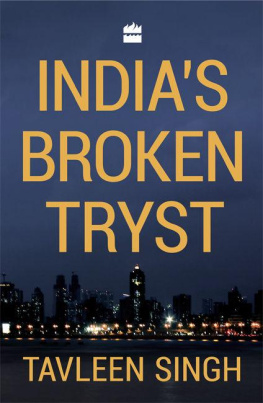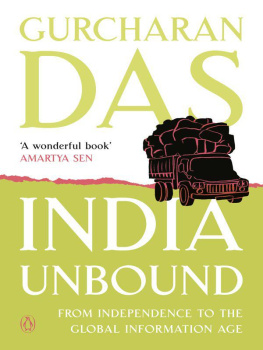More Advance Praise for India Is Broken
This book is the most sustained, accessible, and trenchantly argued alternative account of Indias political economy and democratic crisis that I have seen in many years. Engaging and well written, it tells a striking and disturbing story. A major achievement.
Thomas Blom Hansen, author of Melancholia of Freedom: The Social Life of an Indian Township in South Africa
This is a dazzling book with an ambitious arc. The juncture India stands at today is seen ever more clearly in Ashoka Modys gripping narration. I have rarely experienced history as such a powerful tool. Compellingly written, the book coheres around a central thread that runs right through until the very last line: can India yet deliver on the hope of 1947? It is a tale tinged with sadness, a sense of loss at what might have been.
Kavitha Iyer, author of Landscapes of Loss: The Story of an Indian Drought
Modys book traverses the entire sweep of independent India to show us how we ended up herestruggling economy, soaring unemployment, fractured societyand how to find a way out. All through, it makes a resonating connection between high-level economic and political discourse and the real lives of Indians, especially young Indians. India Is Broken is as absorbing as it is ambitious.
Snigdha Poonam, author of Dreamers: How Young Indians Are Changing Their World
In India Is Broken, Ashoka Mody writes a readable, comprehensive, though depressing history of what has gone wrong with the Indian economy. The book is a devastating take-no-prisoners indictment of the policies of successive governments. While you may not agree with the relentless criticism, and while the book is light on prescriptions, it is a must read for anyone who wants to understand Indias challenges today and their roots in the past.
Raghuram Rajan, University of Chicago and former Governor of the Reserve Bank of India.
INDIA IS BROKEN
A People Betrayed, Independence to Today
ASHOKA MODY
STANFORD UNIVERSITY PRESS
Stanford, California
STANFORD UNIVERSITY PRESS
Stanford, California
2023 by Ashoka Mody. All rights reserved.
No part of this book may be reproduced or transmitted in any form or by any means, electronic or mechanical, including photocopying and recording, or in any information storage or retrieval system without the prior written permission of Stanford University Press.
Printed in the United States of America on acid-free, archival-quality paper
Library of Congress Cataloging-in-Publication Data
Names: Mody, Ashoka, author.
Title: India is broken : a people betrayed, independence to today / Ashoka Mody.
Description: Stanford, California : Stanford University Press, 2023. | Includes bibliographical references and index.
Identifiers: LCCN 2022019311 (print) | LCCN 2022019312 (ebook) | ISBN 9781503630055 (cloth) | ISBN 9781503634220 (ebook)
Subjects: LCSH: IndiaEconomic conditions1947- | IndiaEconomic policy1947- | IndiaPolitics and government1947
Classification: LCC HC435.2 .M63 2023 (print) | LCC HC435.2 (ebook) | DDC 330.954dc23/eng/20220609
LC record available at https://lccn.loc.gov/2022019311
LC ebook record available at https://lccn.loc.gov/2022019312
Cover photos: (top) Alamy; (lower) Sujata Mody, Penn Thozhilalargal Sangam Archive
Typeset at Newgen in 11.5/15 Arno Pro
To
Krishnan and Lakshman
My sons, my best friends, in gratitude for their free tech support
TABLE OF CONTENTS
PREFACE
In the decades since independence, Indias achievements have fueled a narrative of a country on the rise. In awe-inspiring displays since 1951, hundreds of millions of Indians have gone to the polls every five years to select their leaders. Starting in the 1980s, India also captured the worlds imagination as a potential economic superpower. Indian students excelled at top American and British universities. Indian information technology companies and customer-service agents on telephone helplines became commonplace. Soon, Indians occupied positions of great prominence at leading international companies. In 2004, U.S. presidential hopeful John Kerry tried to shock his fellow Americans by asserting that internet connectivity in the southern Indian city of Bangalore was superior to that in many American cities and towns. And although Indias GDP growth began collapsing in 2018, Indias image as a rapidly emerging player on the global stage persisted. Internationally recognizable and acclaimed Indians grew in number. Analyzing the COVID-19 crisis in 2020 and after, doctors of Indian origin were ubiquitous commentators on American television.
International observers and Indian pundits have long predicted that democratic Indias plodding economic tortoise will outpace authoritarian Chinas cocky hare. The worlds largest democracy as an economic superpower is a tantalizing prospectnot just for Indian citizens but for the world, which would gain a crucial counterweight to the Chinese economic and geopolitical juggernaut.
The story in this book starts at the hopeful moment when India gained its independence from British colonial rule in 1947. After the horror of the bloody partition of British India into the new Indian and Pakistani states, desperately poor and largely illiterate Indians were anxious to move on. Death rates were falling because of improved management of famines and more widespread availability of medicines that had controlled disease epidemics in Europe. With lower death rates, the number of young Indians looking for jobs surged. Indian leaders and policymakers had one task above all: to create jobs for vast numbers of people. The political response to the employment-creation challenge is the central thread that holds this book together.
From the start, jobs grew slowly. By the second half of the 1960s, frustration with lifes hardships provoked widespread anger. Unable to pacify that anger, Prime Minister Indira Gandhi began moving toward authoritarianism in the late 1960s, culminating in Emergency Rule from June 1975 to March 1977. Although the formality of democracy returned after twenty-one months, the fabric of social trust and the spirit of democracy continued to erode. Corruption lodged itself at the highest levels of government, abuse of the states coercive power grew, and violence to advance narrow interests and win arguments became commonplace. Short-term focus on headline-grabbing policies caused a neglecteven abuseof the public goods essential for good jobs and human welfare: education, health, vibrant cities, a fair judicial system, and a clean environment.
Even as Indias poor job creation and high inflation persisted, East Asian nations, armed with heavy investments in human capital and urban development, established internationally competitive economies that generated near-full employment.
Starting in the mid-1980s, a small group of Indians amassed fabulous fortunes. Simultaneously, the direst forms of poverty began declining. But hundreds of millions of Indians continued to live precarious lives, keeping their heads just above basic sustenance levels. Persistent social anger fed criminal networks and sustained angry Hindu mobs. Hindu nationalism marked a further tear in the social fabric as violent mobs sought new performance arenas.
Today, as of the writing of this book, it is seventy-five years after Independence, and Indias democracy and economy are broken. V-Dem, an academic think tank based in Sweden, categorizes India as an electoral autocracy, a nation that holds elections but where the rule of law and freedom of speech have fallen to unacceptably low levels. COVID-19 revealed the fragility of the Indian economy, which crashed as the first wave of the disease struck. Of the hundred million jobs that disappeared, twenty-five million or more may never come back. More jobs disappeared in the pandemics second wave. These losses have piled on to a large backlog of unfulfilled demand for jobs, and as new batches of young Indians enter the job pipeline, they face the specter of a precarious future. India has an employment crisis is a common refrain.

